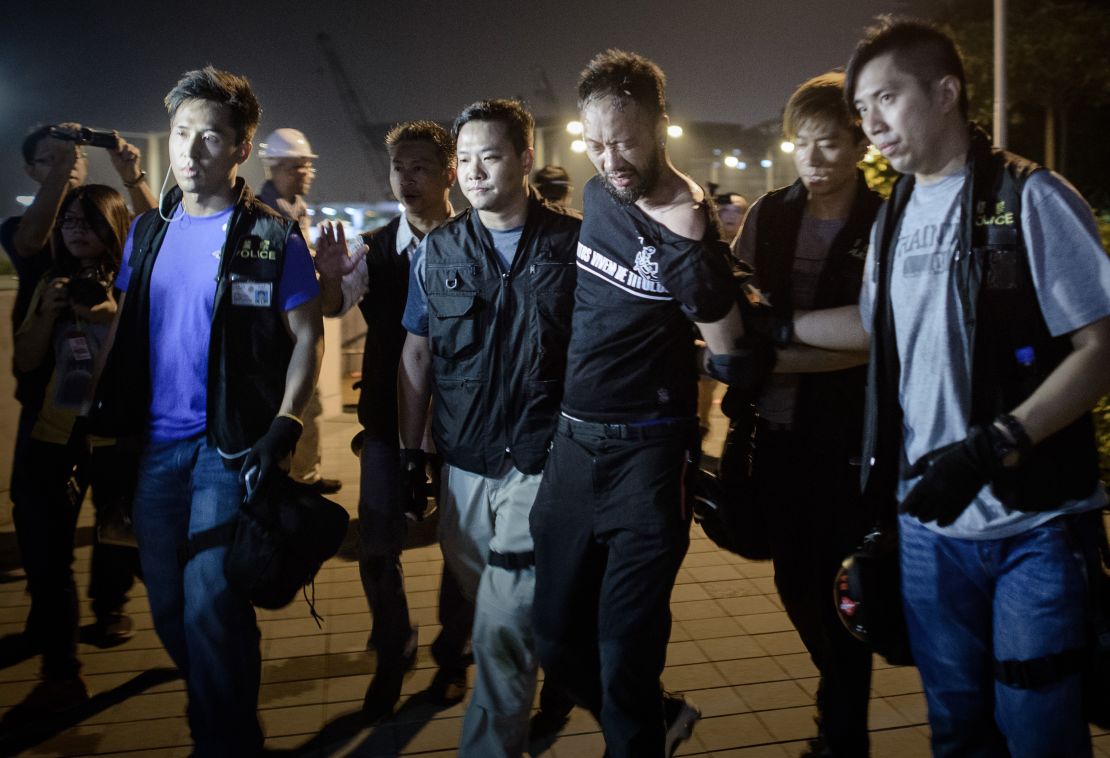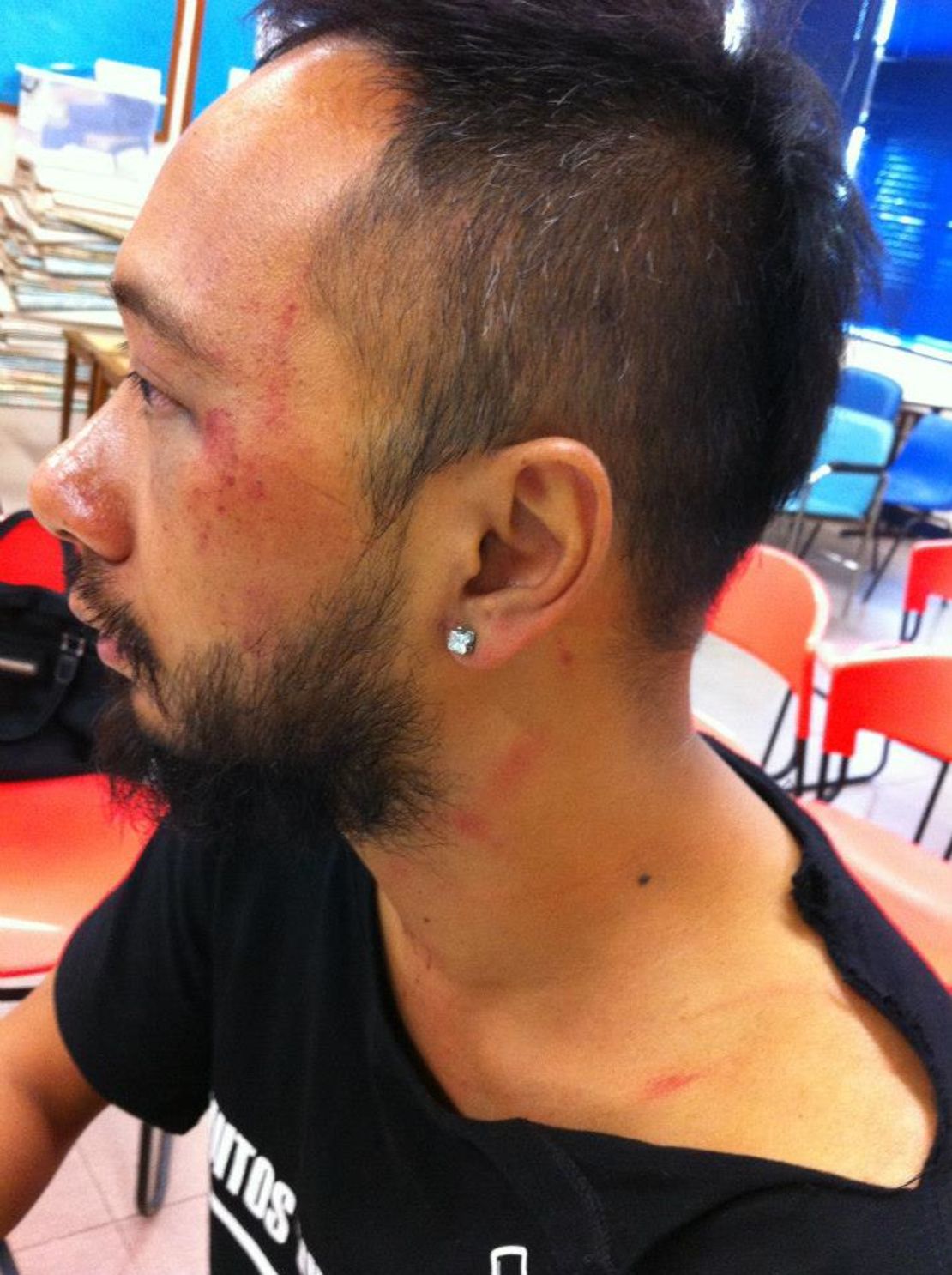Story highlights
Hong Kong protest leader Joshua Wong accuses police of excessive force against him
He says he was kicked, punched and his genitals grabbed during his arrest
Wong was charged with obstructing officers clearing the Mong Kok protest site
Student leaders are now calling on protesters to focus on two other protest sites in the city
Joshua Wong, the most prominent of Hong Kong’s student protest leaders, alleged he was assaulted by police who used excessive force – including repeatedly grabbing his genitals – during his arrest at pro-democracy demonstrations.
Wong, 18, made the claims after appearing in court Thursday charged with obstructing officers clearing a protest site in the city’s Mong Kok district the day earlier.
Wong’s lawyer, Michael Vidler, told CNN his client had been “clearly targeted by police.”
“Excessive force was used and he was assaulted while he was on the ground,” said Vidler.
“Police kicked and punched him and effectively sexually assaulted him – his private parts were grabbed repeatedly and painfully. We’re considering our next steps and will decide over the next few days how to proceed.”
READ MORE: Who is Joshua Wong?
Glasses gone
Footage of Wong’s arrest shows the teenager being suddenly rushed by a man wearing a police vest, then forcefully dragged away and disappearing beneath a huddle of police officers.
Wong, who had earlier been filmed in heated but non-violent exchanges with people clearing the road of barricades, later tweeted he had lost his signature glasses during the arrest.
In response to Wong’s claims, police issued a statement saying that if anyone believed they had been treated unfairly by police, they could take action through the Complaints Against Police Office.
Vidler said Hong Kong police were displaying “increasingly brutal” behavior as the protests entered their third month.
“People are learning the other side of the Hong Kong police and it’s not an attractive side,” he said.


Seven Hong Kong police officers were arrested this week for an alleged assault at a pro-democracy protest in October, in which officers were filmed apparently punching and kicking a demonstrator on a side street.
The alleged victim, a social worker and member of the 1,200-strong election committee that currently chooses Hong Kong’s leader, was photographed with facial bruising and numerous welts on his back in the wake of the incident.
READ MORE: Hong Kong police arrested for alleged assault on protester
Pelted with eggs
Wong was granted bail Thursday, along with two other prominent protest leaders arrested in the efforts to clear the Mong Kok site – Lester Shum, of the Hong Kong Federation of Students, and Leung Kwok-hung, an activist and lawmaker known as “Long Hair.”
The trio was released under the condition they steer clear of parts of Mong Kok, and their cases will be heard in January.
Speaking to reporters after his court appearance, Wong denied the charge against him, saying he had had no physical conflict with officials working to clear the protest site.
Following his remarks, he was pelted with eggs by members of the public. Police said two men, aged 26 and 32, had been arrested and charged with common assault over the incident.
After his court appearance, Shum also told reporters he had been violently arrested, and complained that the bail restriction banning him from parts of Mong Kok was unreasonable, as the Federation of Students’ office was in the district.
Scores arrested
The protest leaders were among nearly 200 people arrested in Mong Kok since police began a major operation Tuesday to clear two main thoroughfares in the district of protesters.
Standoffs between police and protesters continued throughout the week into Friday night, when 28 people were arrested for charges including unlawful assembly, assaulting police, possessing an offensive weapon and hindering police officers, police said.
Protesters calling for universal suffrage have occupied camps around the semi-autonomous Chinese territory for two months, including a main protest site outside government buildings in Admiralty on Hong Kong Island.
They want to be able to nominate candidates for the election of the city’s chief executive in 2017; China’s central government has said they’ll be able to vote only for candidates approved by a pro-Beijing committee.
Mong Kok has been the site of some of the most violent clashes of a predominantly peaceful protest movement. Authorities began clearing the streets of barricades and shelters Tuesday in accordance with court injunctions obtained by local business interests, following complaints that the protests have disrupted commercial life in the city.
The operation sparked occasionally heated clashes with protesters, and prompted threats by demonstrators to reoccupy the site.
‘Abandon Mong Kok’
But on Friday morning, Wong called for protesters in Mong Kok to relocate at the other protest sites in Admiralty and Causeway Bay instead.
In comments to a local radio station, he said the protest movement lacked the manpower to occupy three sites, and cited concerns about police enforcement in Mong Kok.
As well as the alleged use of excessive force during protests, police have used a pepper spray-like solution in confrontations with protesters.
In tweets, Wong also called on fellow protesters to continue their fight. “I ask my friends not to surrender. We still have a chance to battle once more,” he wrote.
On Thursday, a spokeswoman for the Hong Kong Federation of Students, Yvonne Leung, indicated the group might also shift its focus to government buildings in order to build pressure against the city’s leaders.
“I think we have made it very clear that if they [the police] continue the violent way of clearing up the place, we will have further actions,” Leung told public broadcaster Radio Television Hong Kong (RTHK).
“The further actions include a possibility of some escalations pointed at government-related buildings or some of the government-related departments.”
Following the clearance of the Mong Kok thoroughfares, Hong Kong Chief Executive C. Y. Leung urged people to return to the busy commercial precinct to go shopping, RTHK reported.
CNN’s Anjali Tsui, Wilfred Chan, Esther Pang, Karen Chiu and Chun Kit contributed to this report.


